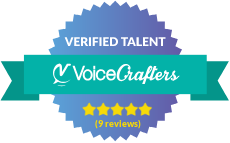|
July 2021 - What NOT to include in your script: A brief guide to overused phrases in corporate videos. Jan 2021 - How Long Does it Take to Record an Audiobook?...and other FAQ's about audiobook narration. Nov 2020 - How to Hire Voice Over Talent for Your Project Oct 2020 - How to Start a Voice Acting Career What NOT to include in your script: A brief guide to overused phrases in corporate videos.7/26/2021
Don’t begin with: |
| If I had a dollar for every time I have recorded those exact words in that exact sequence, I could retire tomorrow on my own private island. It is both important and impressive that your product is cloud-based and mobile-compatible. But as soon as you tell people they can access it anytime, anywhere, on any device, I can almost guarantee that their eyes will glaze over. |
Don’t focus on:
The People
| Companies care about money. A new product launch is designed to make money. You are composing a script to a video because you want people to see it...and give you money. So don’t insult my intelligence by trying to convince me that you’re all about your “People.” The CEO might be the loveliest person on the planet. Your benefits packages might be replete with perks. You might genuinely care about every member of your team. But if you try to tell me that “The People” are your motivation for marketing to me, I simply won’t believe you. Also, 7,000 other videos already told me that. NEXT! |
Don’t confuse biology with business:
[Adjective] is in our DNA
| This is one of the phrases I hear most often, and it always feels jarringly fallacious. Deoxyribonucleic acid is the hereditary material in humans and almost all other organisms (yes of course I Googled that). DNA is not present in a company, corporation, or startup. You can’t say “Trust is in our DNA” or “Success. It’s in our DNA,” because it’s simply not true. It’s like saying “if I hear [adjective] is in our DNA one more time my head will literally explode.” It won’t. That’s not real. So please don’t say things that don’t make sense. Your viewers will thank you for it. As I said at the onset, I’m no scriptwriter. My expertise is bringing life to the words on the page. Imbuing them with meaning and passion. Richly layering emotional subtext beneath even the shortest phrases. So if I’m not a scriptwriter, then why (you may ask) am I telling you how to write your corporate video? Well I’m not, really. Or am I? Click HERE to return to the top of the page. |
How Long Does it Take to Record an Audiobook? ...and other FAQ's about audiobook narration.
1/27/2021
| I have recorded over 250 audiobooks so far in my career. And whether this fact is revealed during casual conversation at a party, or whether I’m reading an email from one of my fans (yes! I have some fans! It’s the most amazing feeling ever!), I tend to be asked a lot of the same questions. Because let’s face it: audiobook narration is completely fascinating. So for this month’s blog entry, I thought I’d field some of the more frequently asked questions about audiobooks. Let’s get to it! |
Do you read the book first?
Of course! You wouldn’t expect actors to perform for an audience without reading the play first, would you? Yes, I read the book thoroughly. I annotate important things that will affect the way I perform in front of the microphone, such as how a character is feeling when they speak, or whether someone is whispering or shouting or crying. I also have a special symbol that I mark next to each character’s lines, so that I know who is speaking and can quickly switch from one character to another during dialogue. If there are any words I am unfamiliar with, or that I don’t 100% know how to pronounce, I research them. It takes a long time to prep an audiobook! Hours and hours and hours, which leads us to:
How long does it take to record an audiobook?
It depends. The more mistakes you make during recording, the longer it takes to record! On average, I’d say it takes one-and-a-half times (1.5x) the finished length of the book. So if an audiobook is, say, ten hours long to listen to, then it will take 15 hours of studio time to record it.
Do you just sit in a recording booth for hours on end, reading out loud?
| Yup! That’s exactly what happens! Although it’s certainly not just “reading out loud.” It’s acting, non-stop, for hours on end. A marathon performance lasting multiple days. Most voice-over actors who record audiobooks will work six-hour recording shifts. Usually 10am to 4pm. And a lot of actors do this every day until the book is finished. Now I personally cannot do that; I don’t have the stamina. I find that I have to record alternate days (every other day) so that my voice doesn’t become exhausted. And even with that schedule, audiobooks can be pretty taxing. I record with a recording engineer. The engineer is in charge of stopping the recording when I make a mistake, and restarting where we left off. This is called a “punch” recording. Many audiobook narrators don’t work with a recording engineer. They record themselves, and when they make a mistake, they erase it themselves and re-record from that spot, all the way through the book. Amazing, right? |
Do you do all the character voices yourself?
Mais oui! Who else is gonna do it? Except for multi-cast audiobooks, wherein a different actor plays each character – similar to an audio play – every character in the audiobook is voiced by one narrator. Which leads me to...
How do you come up with the character voices?
| Here I must take a moment to tip my hat to an amazingly talented actor, Jim Dale, who is well known for creating hundreds of unique character voices for the Harry Potter series. He is an icon of the audiobook world in that regard. How do I do it? Well, I take my cues from the text. The author most often describes each character’s personality and physical appearance, which gives me a lot of clues as to how they might speak. Sometimes the author provides really clear direction. I recently had a character whose voice was described as a “gravelly midsouthern baritone.” So that was a nice easy one. Once I know all about the character, I read their lines aloud in a voice that I think might work for them. If it feels right, I stick with it. And if not, I play around with variations until it feels right. |
How (much) do you get paid?
An audiobook is paid PFH – per finished hour. It doesn’t matter how long it takes to read the book ahead of time, research it, mark up the script, prepare all the character voices, then get into the studio and record it, with all of the errors and the stumbles. None of that is “paid” work. Narrators are paid for the finished product. The average rate for audiobook narrators (once they have some experience) is between $100 and $250 PFH.
I love to read. Can I be an audiobook narrator?
Well, for this question, may I refer you to my blog entry from October: How to Start a Voice Acting Career.
Do you have any burning questions that I haven’t answered here? Please put them in the comments and I’ll add them in! Thank you for reading all about audiobook narration. And if you’re interested in listening to any of my audiobooks, you can find most of them HERE. Enjoy!
Click HERE to return to the top of the page.
Do you have any burning questions that I haven’t answered here? Please put them in the comments and I’ll add them in! Thank you for reading all about audiobook narration. And if you’re interested in listening to any of my audiobooks, you can find most of them HERE. Enjoy!
Click HERE to return to the top of the page.
So you've got a project. An animated video. Or a corporate explainer. Or a voicemail for your new company. How do you hire a professional voice-over talent to record your script? Can you afford it? Where do you begin? Here are some basic things you need to know to make your project a success, make your voice actor happy, and get it right the first time.
Budget I: How much does voice over cost?
| There are voice over actors working on fiverr.com who you can hire for a few bucks. And there are seasoned actors who work exclusively through talent agents, only accept union work, and will cost you the moon. But despite this variance, there is an "average" rate that will apply to most voice over projects. The best place to find current non-union rates is the Global Voice Acting Academy (GVAA) Rate Guide. This fantastic resource has a breakdown of recommended fees per project length and usage, which will give you an idea of where to set your budget. And speaking of project length and usage... |
Budget II: How does the voice actor calculate their fee?
| Generally speaking, all a voice talent needs in order to provide you with a cost proposal are two pieces of information: project length and usage. Length can be in minutes or in words. For most projects, 135 words of script = about one minute of recorded audio. Usage means where the project will be heard. Online? On TV? On your company's voicemail? With those two nuggets of information, a professional voice talent can quickly send you a quote. |
What does the voice actor need in order to record?
- A finalized script. That means you've proofed it, edited it, received all the approvals you need; it's ready to go. We don't need the origins of your corporate philosophy. We don't need to know the backstory (you tried recording it with Quinn from accounting but they didn't sound anywhere near good enough so you realized you need a professional voice). We just need a script.
- Video & Music. If the project is for a video, it's really helpful to see the draft of the video, with or without a scratch track. And if there is music accompanying the voice over, it can be really helpful to hear that too.
- Tone & Speed. A good script will tell the voice actor how it needs to be read, just from the words on the page. Not much additional input is needed from the client. Nonetheless, if you're looking for a specific tone, it is helpful to have a little direction. Here are some "tone" words that help voice actors give you what you need: conversational, professional, friendly, announcer, intelligent, guy/gal next door, warm, smile, informative, authoritative, corporate, etcetera. Pick two or three of those, let your voice actor know, and you're off to the races.
Revisions: How many do I get?
| Well, that depends on the voice actor. If the recording sounds nothing like what you had in mind, let your actor know, and see what they say. Generally, a professional voice talent will get it "right" the first time. If there are a few lines or words that strike you as not quite right, the actor will probably be happy to send you another version of those sentences, as long as you give good direction (i.e. "I was hoping that the words Marketing Performance could sound more exciting in the final sentence, would you mind giving me an alternative take?"). If you change parts or all of the script after the recording has been performed and delivered, there will be an additional cost for that. Because it is new material. |
Go get 'em!
So that's a breakdown of how to hire a voice actor for your project. Good luck!
Click HERE to return to the top of the page.
Click HERE to return to the top of the page.
| People often ask me: “How do I get into voice-over?” Voice-over is a competitive field. You can’t assume immediate success because Quinn from accounting once said you have a nice voice. On the other hand, even the most successful voice-over actors had to start somewhere, right? So how do you get started? For what it’s worth, here is my (professional but certainly opinionated) opinion about how to jump-start your own voice-over career: |
1. Get some training
You wouldn’t start hacking away at people’s hair without attending cosmetology school (I hope). And you can’t start recording voice-over without training. Even if you are an experienced actor, voice-over is a different kettle of fish altogether. So take some classes! A quick Google search will show you what’s near you, or there are plenty of online classes available from anywhere. Once you have some general voice-over training, take note of what you have a proclivity for and then get some specialized training (Corporate videos or medical copy? Audiobooks or animation? Video games or voicemails? They all require different techniques and it takes a few years to get those in your wheelhouse.) DON'T let anyone convince you to record a demo at this point. You're too new; your demo will be sub-par. Also demos can be very expensive. Wait till you get some experience before making a demo.
2. Purchase some equipment
| To continue the “hair” analogy: you wouldn’t cut hair with your kitchen scissors (although that is how I trim my son’s fringe); you would buy some nice shears. And you can't record decent voice-overs without purchasing some basic audio equipment. To start, you need some low-cost but not-too-cheap equipment. Get in touch with a place like Sweetwater sound (www.sweetwater.com) and tell them you’re just starting out as a voice-over artist. They should recommend a starter microphone that will run you around $250 (I'd go with a shotgun mic like a RODE NT2 to cut down on ambient noise, but I'm no mic expert). You also need an audio interface which basically gets the mic signal into your computer. And then get some soundproofing, like a low-cost free-standing booth. You can't record without it - your room will echo and the sound will be crappy. And finally, buy or download some audio editing software so that you can edit your recordings. The industry gold standard is Pro Tools, and sometimes Reaper for audiobooks, but I've always used (and love) Sony Vegas Pro, and it's fine when you're just beginning to start out with something free or low cost like Audacity. |
3. Audition, audition, audition
New hairdressers (I am definitely pushing this analogy too far but I’m sticking with it on principle) practice their technique on volunteers and low-cost jobs before they start working full-time in a fancy salon. And you need to get some practice before auditioning for bigger and better roles. To do this, join one or two of the mega-sites for voice-overs and start auditioning. Voices.com, voice123.com, VoiceBunny.com, etcetera. Use your new equipment to record some basic demos. Be honest in your profile. Say you're new, say you're training, say you're looking to acquire experience, and audition for pro-bono and low-budget jobs. The goal here is to get your toe in the water, not to get a Toyota commercial.
4. Rinse & Repeat
| Repeat 1, 2, and 3 at more and more advanced levels ad nauseam. Seriously. I just upgraded my studio equipment this year. I hire voice-over coaches as-needed to brush up on my skills (animation and commercial are what I’m working on this month). And I audition for zillions of jobs a month. Zillions! As a voice-over professional, that's actually where a lot of your time goes. If you think you’ve got what it takes, you should give it a try. And these pointers are just my honest opinion on how to begin. I hope it’s helpful. Now go get ‘em! Click HERE to return to the top of the page. |
Author
Write something about yourself. No need to be fancy, just an overview.
Archives
July 2021
January 2021
November 2020
October 2020














 RSS Feed
RSS Feed


